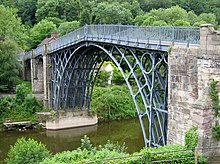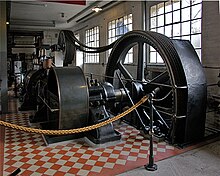

Industrial archaeology (IA) is the systematic study of material evidence associated with the industrial past.[1] This evidence, collectively referred to as industrial heritage, includes buildings, machinery, artifacts, sites, infrastructure, documents and other items associated with the production, manufacture, extraction, transport or construction of a product or range of products. The field of industrial archaeology incorporates a range of disciplines including archaeology, architecture, construction, engineering, historic preservation, museology, technology, urban planning and other specialties, in order to piece together the history of past industrial activities.[2] The scientific interpretation of material evidence is often necessary, as the written record of many industrial techniques is often incomplete or nonexistent. Industrial archaeology includes both the examination of standing structures and sites that must be studied by an excavation.[3]
The field of industrial archaeology developed during the 1950s in Great Britain, at a time when many historic industrial sites and artifacts were being lost throughout that country, including the notable case of Euston Arch in London. In the 1960s and 1970s, with the rise of national cultural heritage movements, industrial archaeology grew as a distinct form of archaeology, with a strong emphasis on preservation, first in Great Britain, and later in the United States and other parts of the world. During this period, the first organized national industrial heritage inventories were begun, including the Industrial Monuments Survey in England and the Historic American Engineering Record in the United States.[4] Additionally, a number of regional and national IA organizations were established, including the North American-based Society for Industrial Archeology in 1971, and the British-based Association for Industrial Archaeology in 1973. That same year, the First International Conference on the Conservation of Industrial Monuments was held at Ironbridge in Shropshire.[5] This conference led, in 1978, to the formal establishment of The International Committee for the Conservation of the Industrial Heritage (commonly known as "TICCIH") as a worldwide organization for the promotion of industrial heritage.[6] The members of these and other IA groups are generally a diverse mix of professionals and amateurs who share a common interest in promoting the study, appreciation and preservation of industrial heritage resources.[2]
- ^ Industrial Archaeology: Principles and Practice, Peter Neaverson and Marilyn Palmer, Routledge, 1998, chapter 1
- ^ a b Society for Industrial Archeology. "About the Society for Industrial Archeology (SIA)". Siahq.org. Retrieved 2014-01-29.
- ^ The Texture of Industry, Robert B. Gordon and Patrick M. Malone, Oxford University Press, 1994, Chapter 1
- ^ "Protecting Industrial Sites". English-heritage.org.uk. Retrieved 2014-01-29.
- ^ Falconer, Keith (3 May 2006). "The industrial heritage in Britain – the first fifty years, Keith Falconer". La Revue Pour l'Histoire du CNRS (14). Histoire-cnrs.revues.org. doi:10.4000/histoire-cnrs.1778. Retrieved 2014-01-29.
- ^ "Agreement" (PDF). Retrieved 2014-01-29.